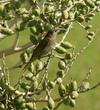Genus Lichmera
Olive Honeyeater - The Olive Honeyeater is a species of bird in the Meliphagidae family. It is endemic to Indonesia.
Buru Honeyeater - Its natural habitats are subtropical or tropical moist lowland forests and subtropical or tropical moist montanes.
Dark-brown Honeyeater - The Grey-eared Honeyeater is 13 to 17 cm long with the males being larger than the females. The plumage is mainly dull green-brown above and grey with an olive tint below. The cheeks are silvery-grey, and the crown is dark grey. The black bill is long and slightly downcurved; the legs and feet are blue-grey. Juveniles are paler than the adults without the silvery cheeks.
Brown Honeyeater - In Australia it occurs in thickets throughout much of western, northern and eastern Australia, being absent only from the coldest or wettest areas.
Lichmera limbata - Its natural habitats are subtropical or tropical moist lowland forests and subtropical or tropical mangrove forests.
Scaly-crowned Honeyeater - Its natural habitats are subtropical or tropical moist lowland forests and subtropical or tropical moist montanes.
Seram Honeyeater - Its natural habitat is subtropical or tropical moist montanes.
Black-chested Honeyeater - Its natural habitats are subtropical or tropical moist lowland forests, subtropical or tropical moist shrubland, and rural gardens. It is threatened by habitat loss.
White-tufted Honeyeater - Its natural habitats are subtropical or tropical dry forests, subtropical or tropical moist lowland forests, and subtropical or tropical mangrove forests.


